Squirrel World (3 page)
Authors: Johanna Hurwitz

I Leave Home
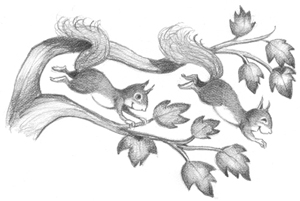
Now here’s the truth of the matter: There had to be a reason why I’d never gone off to see this Lexington Avenue place before. After all, you’d think I’d have been curious. And the fact is, I was. But I was not so curious that I’d have deserted my wonderful home and my enormous family and set off on my own. So when Lenox suggested we go together, I realized that this was my chance.
But there was another part to the truth: I was scared.
In the park, there are thousands of trees that I can climb for safety. There are bushes to hide behind, holes to slip into, and enough brothers, sisters, aunts, uncles, and cousins to confuse anyone trying to find me. Out on the city streets, who knew where a squirrel could find safety? Still, I was determined to go through with the plan.
I crawled into my hole for the night and curled up, making room for my visitor. After complaining briefly that he felt cramped, Lenox fell fast asleep. I remained awake. I lay quietly and savored the familiar smell of my nest. I stuck out a paw and touched each of my treasures that was close by. They were all things that I had found in the park.
I had two unmatched mittens lost by small humans. I had several metal disks called coins that humans exchange for ice cream, bags of peanuts, or balloons in warm weather, when the vendors come into the park.
My newest and most favorite possession was a woolen cap with a funny top called a pom-pom that I’d watched a man remove from his head on an unseasonably warm day. He had stuffed this human head covering into his pocket, but from my perch on a tree branch I had noticed that the cap was sticking halfway in and halfway out. I had a feeling that it might come all the way out if I waited patiently. Sure enough, as the man walked, the cap worked its way free of the pocket. It landed softly on the ground, and instantly I pounced on it, picked it up in
my teeth, and climbed with it up the nearest tree. The man never noticed at all.
However, old Uncle Ninety-nine happened to observe me. “That’s not edible, you know,” he called out.
But unlike my uncle, I think of more than just my stomach. I knew that the cap would make a warm, cozy lining for my nest. I removed the cap from my mouth just long enough to call out to him, “A nut this large would make me sick.” Then, securing the cap firmly between my teeth, I ran and leaped and made it all the way home.
Now I snuggled deep inside the cap. The evening was cool, and I was glad to have the cap. I wished there were a way that I could bring this wonderful possession along with me on my travels, but I knew that was
impossible. It will be waiting here for me when I return, I thought.
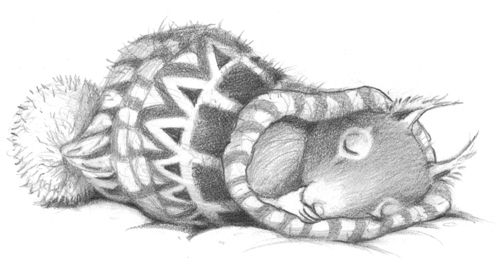
The next thing I knew, the first faint light of morning was showing, and Lenox was poking me.
“Come on, come on,” he chattered impatiently. When he saw me stirring, he climbed outside.
I stretched and scratched my head and then jumped out to the limb where Lenox was standing. “Hold your fleas,” I told him. “I’m ready to go.”
It was quiet in the park so early in the morning. No humans were in sight. Only a few birds were softly beginning their daily songs. I saw a robin pulling a large worm from the ground. I knew he was going to bring it to his mate, who was already sitting on a nest of blue eggs.
By the time Lenox and I passed this way again, the eggs would probably have hatched.
“This is a good place, isn’t it?” I said to Lenox as we raced toward the eastern edge of the park.
“Now don’t change your mind. Don’t back out of our plan,” said Lenox, looking at me nervously.
“I don’t break my promises,” I told him. “But I can still admire this place. After all,
spring is the best time here, with all the new buds and seedpods and more people coming and dropping their food on the ground.” I paused and thought a moment. “Well, summer is pretty special too: all the trees lush and green, hordes of people having picnics, and the trash bins overflowing. Then there’s autumn—”
“Stop, stop!” shouted Lenox. “One more minute and you are going to talk yourself out of this trip.”
So I closed my mouth, and as we ran I remembered jumping into mounds of leaves in the autumn. It’s the most fun imaginable. Well, except for playing in the winter. I love to make tracks on freshly fallen snow. My squirrel world in the park is absolutely the most wonderful life one could ever ask for.
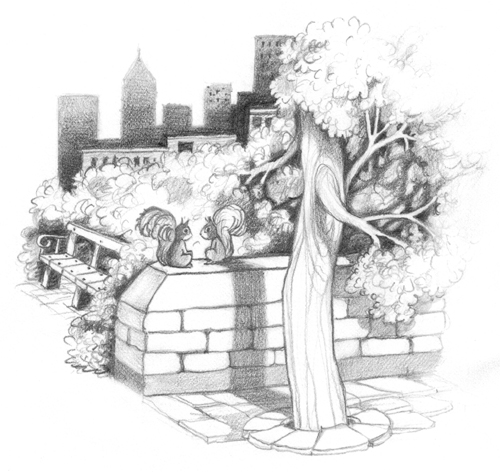
It didn’t take long for us to reach the eastern edge of the park. There’s a wide avenue there called Fifth. One of my sisters is named Fifth, too. During the day there are a lot of humans walking both ways along the avenue. There’s also loads of traffic on wheels—cars, buses, trucks, and bicycles. For some reason, the traffic goes in only
one direction: south. But it was still so early in the morning that the avenue was quiet. Lenox and I could cross the broad street with ease. As I turned my head to look back at the park, I hoped the streets that lay ahead of us would be as simple to cross.
“Look how dull it is here without trees,” I commented to Lenox as we continued on our way. There were tall buildings on both sides of the street but only an occasional square of earth with a tree managing to grow out of it. Beneath our feet was hard cement. In one or two places, where there was a crack, tiny blades of grass were trying hard to grow.
“There’s more to life than trees,” said Lenox. “I’m sure when we reach Lexington Avenue, we’ll find all sorts of other things to delight us.”
“I don’t know where you get that idea,” I told him. But I kept going on. By the time we reached the next avenue, which is named Madison, my paws were aching. Lenox must have felt the same way, for he grumbled, “I don’t like walking on cement.”
“Humans don’t seem to mind,” I re- sponded. “Perhaps it’s because they wear coverings on their feet—shoes, boots, sandals.”
“Paws are best,” said Lenox. “And when we reach Lexington Avenue, the ground will be soft and comforting.”
I could see that he was limping from pain. Luckily, one of the few trees was at hand. “Let’s climb up here and take a rest,” I suggested.
“If you insist,” said Lenox, running quickly up the tree, which was a ginkgo. I joined him,
and the two of us licked our swollen paws to comfort them. Of course, there are cement walks throughout the park, but no squirrel remains very long on the hard, rough ground when there is soft, cool earth nearby.
As we sat on an upper branch of the tree, we observed the nature of the day constantly changing. First a few and then more and more people and cars passed by us. Just like in the park, there were equal numbers of people going in either direction, all of them very focused on wherever they were headed. They didn’t take any time to stop and look around. Humans are very strange.
Fortunately, humans are also hungry. It wasn’t long before there were dropped bits of bagels and doughnuts in the trash can near the base of the tree. I jumped down and
foraged for a good snack. Some pigeons flew overhead, waiting till we’d dropped some crumbs on the ground for them. So I obliged and broke off a bit of doughnut. Instantly a dozen more pigeons appeared out of nowhere.
“Don’t,” cautioned Lenox. “We don’t want to make a spectacle of ourselves.”
But no one stopped to watch. Pigeons and squirrels seemed invisible to the humans on the street.
After eating, Lenox and I decided it was time to digest our meal. So we each picked a crook of the tree and took a snooze. So far, our adventure had been pretty tame, and I was thankful for that. I didn’t know that things were going to change very shortly.
A Hole in the Ground
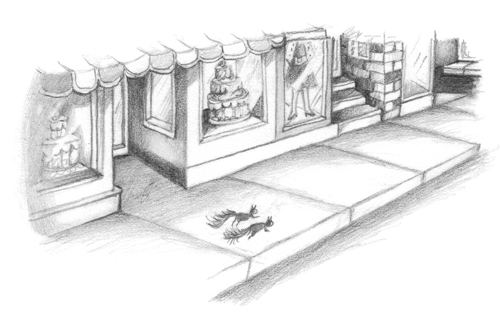
After a short rest, I decided we should continue. “Are you ready to go on?” I asked Lenox.
He opened his eyes, scratched himself, and nodded. “Of course,” he said. “I was waiting for you.”
We jumped down and continued east. The day was changing. Instead of warming up, as days usually do, a brisk wind was
blowing. The sky had started to grow darker, and it became evident that it was going to rain before long. Squirrels never mind rain. The water disposes of fleas and fills puddles for us to drink from. And when we’ve had enough rain, we give ourselves a good shake to dry our fur and then cuddle up in a tree hole. But here, outside the park, the trees were too small and young to have deep, protective holes. I didn’t look forward to rain the way I would have inside the park.
Sure enough, before we had gone very far, the rain began to fall. All around us, humans opened their rain protectors, held them over their heads, and walked faster than ever. Lenox and I had to watch out for their feet. Twice I just missed being kicked by a hurrying human.
“The rain is wetter here than in the park,” Lenox complained to me.
“Rain is rain,” I replied. “It’s all the same everywhere.”
“No, no,” he insisted. “It will be better on Lexington Avenue. It will be less wet and less cold there.”
I didn’t see how Lexington Avenue could possibly live up to my cousin’s expectations.
We reached the next street, which I knew was Park Avenue. I had always assumed that the name meant it was really another park. My bird friends who have flown all over the city have told me that there are more than 1,700 parks in New York, which cover more than 28,000 acres. Well, if this counted as one of those parks, what a joke! There was a
bit of grass in the middle of the street, but no trees, no benches, no bushes—nothing. What a ridiculous park this is, I thought as the rain continued to drip off my fur. Nevertheless, I automatically found myself sniffing and digging a hole. There could be a nut buried in the soil, I thought. I found nothing. After a second unsuccessful try, I realized it was useless. There were no other squirrels around to have buried anything for us to find.
“Come on, come on,” nagged Lenox.
And so we went on again, crossing onto the cement.
Just when we were both as wet as we’d ever been in our lives, we noticed great numbers of humans heading toward a gigantic hole in the ground.
We both paused for a moment and then did what any wet animal would do: We went into the hole, too. There was a steep flight of steps to help the humans make their way down. Luckily, there are steps in some areas of the park, so both Lenox and I knew how to use them.
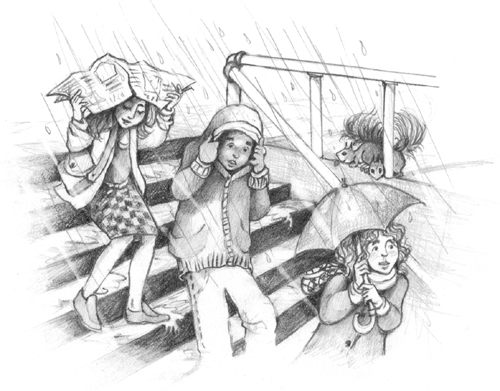
Midway down, I heard the most horrible roar. The ground vibrated, and I put my
paws over my ears to shut out the intense noise and ran to a corner of the stairwell. Some birds who had returned from a winter in South America once told me about an earthquake. I was sure an earthquake had come to New York now. But just as I was about to resign myself to a certain end, the roar stopped with a terrible screeching sound. Then it was quiet.
“What was that?” asked Lenox, shaking with fright.
“I think it was an earthquake,” I told him. “But look how brave the humans are. They don’t seem to be afraid of it at all.”
We watched as the figures on the steps kept moving. Many went downward. But now there was an equal number moving upward. Can’t they make up their minds? I wondered.
I was just about to move downward again too when the sound returned. Lenox and I cowered with fear on the steps for many minutes. Eventually I began to see a pattern: the loud sounds, the screeching, the quieter times, and then the loud sounds again—and through it all, humans walking in both directions.
“Those noises don’t mean a thing,” said Lenox. “Look how the people keep moving toward them.”
“Yes. But see how there are other people going in the other direction,” I pointed out.
“But they don’t look as if they’ve been injured in any way. It’s obviously perfectly safe. The noise must just be meant to keep bad creatures away.”
There seemed to be some logic to Lenox’s statement. So I bravely followed him, and we
continued to the end of the flight of stairs. The area was dark as night but lit by small man-made moons. We looked around us and saw a large dark tunnel. There are tunnels in the park, too. I wondered where this one led and whether we should run into it.
“Look, there are squirrels down here!” called out a human voice.
“They must be lost,” someone said.
“We’re not lost at all,” chattered Lenox indignantly. “We know exactly where we’re going.”
But of course humans can’t understand us the way we can understand them.
Suddenly the vibrations and racket began again. We watched in horror as first lights and then a huge silver object came out of a tunnel toward us. I shuddered to think
what would have become of us had we been inside the tunnel.
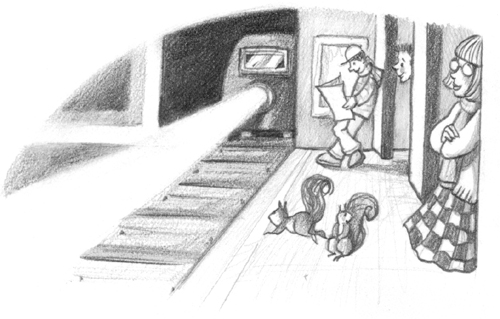
Because we were closer than ever, the sound was louder than ever. But again it screeched to a halt. Doors on the silver object opened, and people got out. Others went in. I guessed it was a type of very noisy bus.
“Are the squirrels going to take the subway?” a human called out as he entered the vehicle.
The people standing around began to laugh.
“Did they pay for a ride?” someone called out.
The doors closed while Lenox and I watched, mesmerized.
Then the huge object began moving, accompanied by the horrific noise, with that poor, helpless person inside.
“Humans are insane,” I told Lenox. “Why would they voluntarily enter such an object when they can be above ground, where it is quieter and prettier?”
“And wetter,” he reminded me.
“I’d much rather be wet than have my eardrums assaulted,” I said.
“Are you afraid?” asked Lenox.
“No,” I said. I thought a moment. What was wrong with admitting fear? “Well, maybe I am. But whatever—there must be a better way to keep dry. And a better way to get to Lexington Avenue.”
I turned in the direction from which we had come and ran back up the stairway.
“Don’t leave me!” shrieked Lenox. And he followed after me. He might not have wanted to admit it, but he was afraid, too.